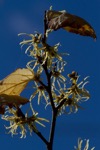| Scientific: | Hamamelis virginiana |
|---|---|
| Other: | Witch hazel |
| Family: | Hamamelidaceae |
Witch hazel is rich in tannins making it a strong astringent. It can be taken both internally and externally to treat a variety of conditions involving infections, inflamed skin, and mucous membranes.
Externally, witch hazel extracts are often applied to irritated and/or damaged skin including different forms of dermatitis (e.g. eczema, poison ivy). Applied to bleeding wounds and ulcers, witch hazel acts as a styptic to arrest bleeding and forms a protective barrier that promotes healing and prevents infection. It can reduce the pain and swelling in those suffering from engorged veins, like hemorrhoids and varicose veins. Research reveals it possess antiviral actions against several viruses including those that cause warts.
Witch hazel is used internally to a lesser degree but has been historically used to treat infectious diarrhea and gastrointestinal ulcers. Because of the high tannin content internal use should be restricted for short periods of time because it can decrease the absorption of nutrients and drugs.
Strong astringent.
Dermatologic (topical application)
• varicosities
- varicose veins
- hemorrhoids
- phlebitis
- venous insufficiency
• trauma
- sprains
- hematomas
- bruises
• dermatitis
- wheeping eczema
- contact dermatitis
Gastrointestinal
• over-relaxed or inflamed mucous membranes with bleeding:
• infectiod diarrhea (dysentery)
• inflammatory bowel disease (IBD)
• apthous ulcers
• gastric ulcers
• prolapsed rectum (enema or suppository)
• rectal bleeding
• proctitis (topical application)
• hemorrhoids (topical application)
• anal fissures
Gynecological (douche)
• leukorrhea
• vaginal prolapse
• post-partum uterine bleeding
• Astringent
• Antiinflammatory
• Antihemorrhagic
• Styptic
• Tannins
• Catechins
• Flavonoids
• Volatile Oils
• Tincture (1:5 in 40% EtOH): 1-2 ml tid
• Decoction (dried herb): 1 tsp tid
Contraindications: External use over large areas of damaged skin (as tannins can be toxic when absorbed systemically).
Long-term use: Avoid use. Tannins may decrease absorption of nutrients, cause constipation, irritate the stomach, and cause liver disease.
High doses: Avoid use. Tannins may decrease absorption of nutrients, cause constipation, irritate the stomach, and cause liver disease.
- Iron supplements • may reduce the absorption of non-heme iron. Take iron supplements a few hours apart.
Barnes J, Anderson LA, Phillipson JD. Herbal Medicines, 3rd ed. London: Pharmaceutical Press, 2007.
Bone K. Principles and Practice of Phytotherapy. Edinburgh: Churchill Livingstone, 2000.
Bone K. A Clinical Guide to Blending Liquid Herbs: Herbal Formulations for the Individual Patient. St Louis, MO: Churchill Livingstone, 2003.
Brinker F. The Toxicology of Botanical Medicines, 3rd ed. Sandy, Oregon: Eclectic Medical Publications, 2000.
Felter HW, Lloyd JU. King's American Dispensatory. 1898. http://www.ibiblio.org/herbmed/eclectic/kings/main.html. Accessed: August 19, 2006.
Hoffman D. Medical Herbalism. Rochester, Vermont: Healing Arts Press, 2003.
Weiss RF. Herbal Medicine. Beaconsfield, England: Beaconsfield Publishers Ltd, 1988.
Williamson EM, ed. Major Herbs of Ayurveda. Edinburgh: Churchill Livingstone, 2002
Disclaimer: This content is subject to change. The information is intended to inform and educate; it does not replace the medical evaluation, advice, diagnosis or treatment by a healthcare professional. www.nhpassist.com © 2014 NDAssist Inc. and/or its affiliates. All rights reserved.

|
Witch hazel
SummaryWitch hazel is rich in tannins making it a strong astringent. It can be taken both internally and externally to treat a variety of conditions involving infections, inflamed skin, and mucous membranes. IndicationsSign in requiredActionsSign in requiredConstituentsSign in requiredPosologySign in requiredSafetySign in requiredInteractionsSign in requiredReferencesSign in required |
|---|